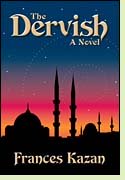The Dervish
by Frances Kazan
Reviewed by Margaret Donsbach

The Dervish is a sequel to Halide's Gift, a biographical novel about the extraordinary Turkish woman Halide Edib, whose father, a Turkish official in the court of the Ottoman sultan, gave her a Western education she later used in the cause of Turkish independence. In the sequel, the central character is Mary Burnham, an American grieving her husband's death in World War I, who travels to Turkey to visit her sister, the wife of an American diplomat. Mary's life intersects with Halide's after she impulsively accepts a document from a young man in desperate danger. Through Halide, she meets Mustafa, another Turk dedicated to the independence struggle and its leader, Kemal Atatürk.
The novel is well researched and introduces readers to the complexities of a changing Turkey in the wake of the fall of the Ottomans, as Britain attempts to hold and govern a people its officials don't even attempt to understand. Halide is as determined an advocate for women's rights as she is for Turkish self-government, part of a movement that would sweep an ancient Middle Eastern culture into the modern world.
Except for a few scenes, the novel feels dispassionate. Mary's love affair with Mustafa evokes little emotion, because the story never really shows how she see or experiences him. Likewise, it is never clear what attracts Mustafa to this rather bland American woman. The one time when Mary and the novel truly come to life is her chance encounter with the terrified young man pursued by British soldiers: "He must have been about seventeen, a trace of a moustache on his upper lip. Perspiration trickled down his cheeks, and his eyes brimmed with tears." The Dervish could potentially have been gripping if a similar intensity of emotion and vividness of description had been devoted to Halide, Mustafa and other characters who play more than walk-on roles in the story. (2013; 247 pages, including a set of discussion questions for reading groups)
More about The Dervish at Powell's Books or Amazon.comOther novels set in Turkey:
The Siege by Ismail Kadare (1970), about a Christian citadel in fifteenth century Albania and its defiance of the Ottoman Turks and their inevitable conquest. More info
Birds Without Wings by Louis de Bernieres (2004), about life in a small Turkish village at the end of the Ottoman Empire. More info
The Stone Woman by Tariq Ali (2000), about a wealthy Istanbul family in the summer of 1899 as the Ottoman Empire decays. More info
Nonfiction about Kemal Atatürk, Halide Edib and Turkey:
Atatürk: An Intellectual Biography by M. Sukru Hanioglu (2013). More info
Memoirs of Halide Edib by Halide Edib (1926; recent English edition 2005). More info
The Young Turk Legacy and Nation Building: From the Ottoman Empire to Atatürk's Turkey by Eric J. Zurcher (2010). More info
Online:
Halide Edib Adivar at Encyclopedia Britannica
Back to Novels of the Middle East
Back to Directory of Book Reviews